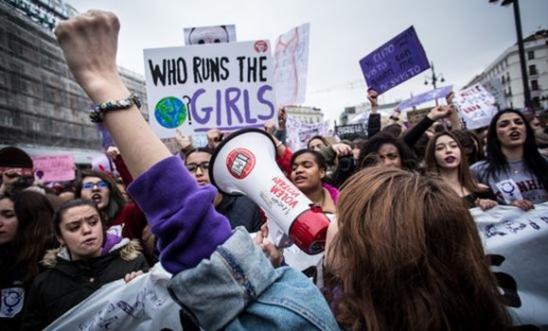
Press releases
UK: 'Deeply draconian' Public Order Bill must be rejected by Lords - New Briefing

Bill enters Report Stage in House of Lords today with Amnesty and 73 other organisations calling on parliamentarians to reject it
Controversial proposals have been criticised by police, Home Office, His Majesty’s Inspectorate of Constabulary as ‘unworkable’ and ‘incompatible with human rights’
‘We allow those in power to make protest a crime at our peril’ - Oliver Feeley-Sprague
‘Protest remains at the heart of how we stand up to power’ - Martha Spurrier
Amnesty International and 73 other organisations are calling on politicians to reject the “deeply draconian” Public Order Bill which enters Report Stage in the House of Lords today (Monday 30 January).
In a comprehensive parliamentary briefing, Amnesty International UK, Liberty, Big Brother Watch, Greenpeace, the Black Equity Organisation, The Network for Police Monitoring and the TUC - among others - warn that amendments made to the bill amount to a “staggering escalation of the Government’s clampdown on protest”.
Throughout its passage in the House of Lords, the bill has been criticised by peers for being “draconian”, “worrying,” and “open to serious objection and in some ways misconceived.”
Shortly before the Public Order Bill’s Report Stage, the Government added amendments to expand police powers even further - allowing them to intervene in and impose conditions on a far wider range of protests.
The coalition is urging all peers to attend the bill’s Report Stage, speak up to defend protest rights, and support amendments to mitigate its worst effects.
Oliver Feeley-Sprague, Military, Security and Police Programme Director at Amnesty UK, said:
“This bill, and its last-minute amendments, are deeply draconian and must be called out and rejected before it’s too late.
“The right to protest is fundamental to a free and fair society - a right for which people have had to fight long and hard. Without the right to protest, everyone’s ability to hold the powerful to account suffers.
“These types of restrictions are likely to have a chilling effect by seriously dissuading people from joining protests in the first place.
“Protest is meant to be disruptive, it can be very inconvenient, but it’s vital for a healthy open society. We allow those in power to make protest a crime at our peril.”
Martha Spurrier, Director at Liberty, said:
“Protest is a fundamental right, not a gift from the State. But our right to protest continues to be attacked by a Government determined to silence people and hide from accountability.
“The Public Order Bill resurrects dangerous anti-protest proposals already resoundingly rejected by the people and Parliament. The expansion of stop-and-search, the introduction of protest banning orders, and a raft of new criminal offences will strike at the very heart of protest, and could criminalise anyone who takes to the streets for causes they believe in.
“The threat of the Public Order Bill must not be underestimated. From striking for workers’ rights, demonstrating against the Government’s Rwanda plan, to gatherings in Parliament Square about the cost-of-living crisis, to people protesting for racial and climate justice, it’s clear that protest remains at the heart of how we stand up to power and we must fight to defend it.”
A grave threat to human rights in the UK
Amnesty has long held the view that the police have a very broad range of existing powers at their disposal to deal with offences that may take place during a protest. The organisation is concerned that the breadth of those powers already give scope for subjective over-policing and potential abuse of those powers.
Shortly before the Public Order Bill’s Report Stage, the Government added amendments to define “serious disruption” in relation to certain new offences, limit the defence of reasonable excuse, and create new triggers for the police to impose conditions on whether a protest can even take place.
Together, they constitute a drastic, further expansion of police powers, allowing the police to intervene in and impose conditions on protests that have a “more than minor” rather than “serious” impact. Far from clarifying matters, these amendments exacerbate legal uncertainty and threaten to further restrict the right to protest.
Other measures in the bill have been criticised by the police themselves, the Home Office, His Majesty’s Inspectorate of Constabulary and Fire & Rescue Services, and former senior police advisors for being “unworkable” and incompatible with the UK’s international human rights obligations. Most recently, five UN Special Rapporteurs have said the bill “could result in undue and grave restrictions” on civil liberties if not seriously amended.
No coherent case has been made by the Government for these expansive new powers, with the Director of Public Prosecutions stating recently that the authorities “already have the legal tools” they need.
Amnesty and the coalition of 73 organisations - spanning the human rights, privacy, criminal justice, democracy, children’s rights, international development, environment, freedom of speech, health, trade union, women’s rights, racial justice, housing, legal, community, migrants’ rights and faith sectors - oppose the Public Order Bill’s anti-protest measures in their entirety.